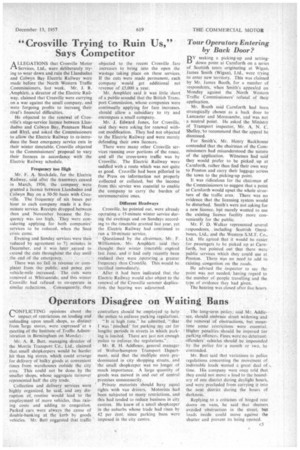Operators Disagree on Waiting Bans
Page 47

If you've noticed an error in this article please click here to report it so we can fix it.
rONFUCTiNG opinions about the
impact, of restrictions on loading and unloading upon small shops, as distinct from large stores, were expressed'at a meeting of the Institute of Traffic Administration in Birmingham on Monday.
Mr. A. R. Butt, managing director of the Morris Transport Co., Ltd., claimed that small shopkeepers would be harder hit than big stores, which could arrange for delivery of bulky goods at convenient times from warehouses outside the city area. This could not be done by the smaller shops, whose aggregate turnover represented half the city trade.
Collection and delivery services were highly organized. he said. and any disruption of. routine would lead to the employment of more vehicles, thus raising costs and adding to congestion. Parked cars were always the cause of .double-banking at the kerb by goods vehicles. Mr. Butt suggested that traffic controllers should be employed to help the police to enforce parking regulations,
" It is high time," he admitted, "that I was ' pinched' for parking my car for lengthy periods in streets in which parking is limited. There are just not enough police to enforce the regulations.".
Mr. R. H. Addlesee. general manager of Wolverhampton Transport Department, said that the multiple store predominated in city shopping streets, and the small shopkeeper was no longer of much importance. A large quantity of goods was moved in and out of central premises unnecessarily.
Private motorists should hasp equal rights with van drivers. Motorists had been subjected to many restrictions, and this had tended to reduce business in city centres. He knew of a small shopkeeper in the suburbs whose trade had risen by 42 per cent. since parking bans were imposed in the city centre. • The long-term policy; said Mr. Addlesee, should embrace street widening and the removal of obstructions, but meantime some restrictions were essential.
• Higher penalties should be imposed for parking offences. Fines were no deterrent: offenders' vehicles should be impounded by the police for a month or two, he contended.
Mr. Butt said that variations in police regulations concerning the movement of indivisible loads wasted a great deal of time. his company were once told that they could not move a load to the boundary of one district daring daylight hours, and were precluded from carrying it into the next district during the hours of darkness.
Replying to a criticism of hinged rear doors on vans, he said that shutters avoided obstruction in the street, but loads inside could move against the shutter and prevent its being opened.




















































































































